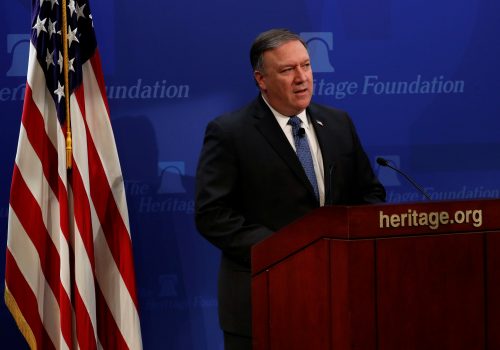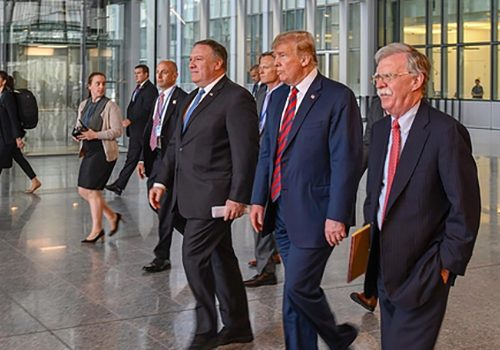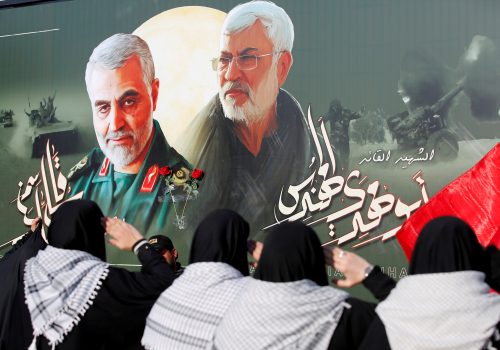‘Maximum pressure’ on the economy won’t change Iran’s behavior
In a speech he gave at a meeting with Iranian students in November 1980, the late Ayatollah Ruhollah Khomeini, founder of Iran’s Islamic Revolution, said he could not imagine, and no wise person could presume the claim that “we spared our bloods so watermelon becomes cheaper.” He explained that those who constantly talk about economics and find economy the foundation of everything “imagine human beings as animals.” This does not mean, of course, that Khomeini had no interest in economic matters. On many occasions, he insisted on the need to improve the condition of the disadvantaged sectors of society. Nevertheless, he offered no specific program to manage the economy and believed that the answers to most economic questions could be found in Islam.
Since US President Donald Trump announced his 2018 withdrawal from the nuclear deal and re-imposed sanctions on Iran, several commentators and politicians have expressed optimism that the worsening economic crisis will force Iran to return to the negotiating table, submit to US demands, and accept a new deal, which will include the nuclear program, its long-range missiles, and malign activities across the region. In August 2018, a senior Israeli official said: “The only hammer available is the economic one, with which there is a good chance that Iran will get down on its knees. Iran is now weak, weakening, and hysterical.”
However, Iran’s conduct over the last few decades indicate otherwise. The economic and social hardships of Iran’s citizens have not gone unnoticed by its leadership. Underlying the considerations dictating Iranian policy are also internal constraints that force the authorities in Tehran to take public opinion into account and adjust its policy to the changing reality. Nevertheless, even when the Iranian leadership has had to make strategic decisions and change its policies, the economy was only one of many considerations and not, necessarily, the primary one.
In July 1988, Iran agreed to a ceasefire to end its prolonged eight-year war with Iraq. It was a historically important decision and a strategic departure from Khomeini’s previous position, which asserted that the war must continue until Saddam Hussein’s final defeat. In a speech on Tehran Radio, Khomeini described his agreement to the ceasefire as “drinking the chalice of poison.” In a letter sent to regime officials, he detailed the reasons and considerations for taking the decision to end the war. Khomeini’s letter emphasized Iran’s military weakness, as it was explained to him by his military commanders, who explicitly admitted that Iran stood no chance of achieving victory in the foreseeable future. Iran’s difficult economic situation and the low morale of the Iranian public are also mentioned in the letter, but it appears that they were secondary factors in the decision.
In 2012, Iran’s leadership was, again, forced into a strategic turnaround in its policy and agreed to reenter the nuclear talks; first, through the secret Oman channel with US representatives and, then, in 2013 with the UN Security Council’s five permanent members plus Germany (P5+1), which led to the historic nuclear deal in July 2015. In his September 2013 speech to commanders of the Islamic Revolutionary Guards Corps (IRGC), Supreme Leader Ayatollah Ali Khamenei appeared to have softened his position, saying he was not opposed to correct diplomatic moves, and believed in “heroic flexibility,” which he described as “very good and necessary” as long as Tehran remained faithful to its principles.
Sanctions certainly played a significant role in Iran’s decision, but the policy reversal cannot be explained solely by economic factors. Rather, one must also account for developments in the Iranian political environment and the technological achievements reached by the Islamic republic in its nuclear program.
The election of Hassan Rouhani as president in the summer of 2013 ended eight years of Mahmoud Ahmadinejad’s tenure, during which Iran suffered not only an acute economic crisis, but also an unprecedented political crisis with the 2009 Green Movement protests, which posed a serious challenge to the regime’s legitimacy. During Ahmadinejad’s presidency, the Islamic Revolutionary Guard Corps (IRGC) expanded their political and economic involvement in infrastructure and development projects throughout Iran. Rouhani’s election created an opportunity for a shift in Iran’s policy with Supreme Leader Khamenei’s backing. The transfer of responsibility for conducting the nuclear negotiations from the Supreme National Security Council to Foreign Minister Mohammad Javad Zarif accelerated the talks, which ultimately resulted in an agreement two years later.
In the nuclear realm, Iran had achieved significant progress by 2012, which allowed it to temporarily suspend parts of its program while maintaining essential components, such as continuing research and development under certain restrictions and retaining its domestic nuclear infrastructure. By mastering the nuclear technology, Iran was able to suspend some of its nuclear activities while keeping its strategic goal of developing a military nuclear option. Additionally, the Obama administration’s willingness to recognize, for the first time, Iran’s right to peacefully enrich uranium was essential in paving the way for an agreement.
Over the past decade, despite considerable economic constraints, Iran has continued to pursue its strategic goals concerning its nuclear program, the development of long-range missiles, and its regional activities. It intensified its involvement in the Syrian civil war from 2011 onwards, sustained considerable involvement in the campaign against the Islamic State of Iraq and al-Sham (ISIS) in Iraq, and continued to arm Lebanese militant group Hezbollah regardless of sanctions and the dismal state of its economy. Iran’s priorities reflect Khamenei’s belief that Iran’s strategic capabilities, especially its nuclear program and long-range missiles, are necessary to ensure the regime’s survival. The US decision to withdraw from the nuclear deal only strengthened Khamenei’s conviction that the US should not be trusted and that the nuclear program is only a pretext for Washington to weaken Iran in order to advance the long-term goal of regime change.
Khamenei is certainly aware that Iran’s citizens are forced to enduring worsening economic conditions, but he adheres to the belief that the solution to the crisis lies in a more autarkic “resistance economy.” He rejects the claim that Iran’s economic problems stem from US sanctions and that it must submit to Western dictates in order to remove them. Moreover, in his view, the return of foreign companies to Iran’s markets could expand Iranian society’s exposure to Western cultural and political influence, and might also jeopardize the economic interests of the IRGC, whose involvement in national economic projects has intensified as a result of sanctions and the departure of foreign companies from Iran.
The bottom line is that those betting that the worsening economic crisis, alone, will force the Supreme Leader to drink from the “poisoned chalice” and recalibrate major elements of Iran’s foreign policy may be disappointed by how events unfold.
Dr. Raz Zimmt is a research fellow at the Institute for National Security Studies (INSS) specializing in Iran. He is also a veteran Iran-watcher in the Israeli Defense Forces.
Image: A woman wears a protective face mask as she pays for clothes at a mall, following the outbreak of the coronavirus disease (COVID-19), after shopping malls and bazaars reopened in Tehran, Iran, April 20, 2020. WANA (West Asia News Agency)/Ali Khara via REUTERS


